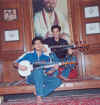| the-south-asian.com AUGUST 2001 | ||
| about us contact us data bank past issues the craft shop the print gallery | ||
|
SOCIETY & CULTURE Traditional
societies - Wisdom and Challenges SOUTH ASIAN FEATURE Hands
Across Borders INTERVIEW
Shantiniketan
and origin of Modern Art
Reinventing
India
Royal
Bengal's last roar?
|
Page 1 of 3
Generation 2000 of Music Gharanas
by Mukesh Khosla The
new generation of the music gharanas is ready to take over the 21st
century. Wasifuddin Dagar is the 20th generation Dhrupad singer; Amaan and Ayaan Ali Bangash are seventh generation; Salil
Mohan Bhatt is tenth generation; Anoushka Shankar has strong music
antecedents and so does Rahul Sharma. All these youngsters, while striving to live up to the family's
name, face the daunting task of popularising classical music to a
young audience that is getting weaned away by pop and film music.... In his Wrangler jeans and Reebok T shirt he could be mistaken for one of
the college lads who spends a better part of his day with friends - missing
lectures, driving fast cars and partying. At home his room resembles a music
shop, with a vast repertoire of cassettes, CDs and posters of pop stars
adorning his walls. But he is no ordinary boy. Amaan Ali Bangash, older son
of the famous sarod maestro Amjad Ali Khan, and grandson of Ustad Hafiz Ali
Khan, bears the great responsibility of carrying the baton of musical
tradition that his father has passed on to him. He and twenty-one year old
younger brother Ayaan are being groomed as the seventh generation of the
Bangash dynasty. Their six generations removed forefather, Mohammad Hashmi
Khan Bangash, a horse trader from Afghanistan who frequently came to India,
played the rabab and was drawn to Indian classical music. He settled in Rewa
where his son, Ghulam Bandegi Khan studied Indian classical music. Bandegi
Khan modified the rabab into the melodious and more intricate sarod, which
has passed down generations to Amjad Ali Khan and now to his two sons. The
onus of carrying on the family tradition is reflected in Amaan's somber countenance. His routine involves eight hours of daily practice to
measure up to his sacred lineage. Amaan was clear about his future while still in school. He studied at
Modern School, Delhi, but unlike many of his classmates he had his
goal marked out clearly. For him the school bell meant going home to
rigorous sarod training. Such was his single mindedness that he refused to
join a regular college and opted for a correspondence course instead. "
I thought I could use these three years better," says Amaan. Amaan and brother Ayaan have been accompanying their father to music
festivals in India and abroad. Both Amaan and Ayaan have played in
prestigious locations such as the Carnegie Hall, Kennedy Center, St. James’s
Palace and Barbican Centre. They have also played, together with their
father, at a special concert for HRH Prince Charles at his High Grove
residence. Amaan was awarded the Soorya Award in Trivandrum in 1996, and the
following year the Prime Minister of India awarded him ‘The Best Young
Musician of the Year’ Award. Children of an inter-faith marriage, Amaan and Ayaan are devoted sons and
disciples. Their mother Subhalakshmi Khan gave up her career in Indian
classical dancing to devote herself to her family. Copyright © 2000 - 2001 [the-south-asian.com]. Intellectual Property. All rights reserved. |
|
